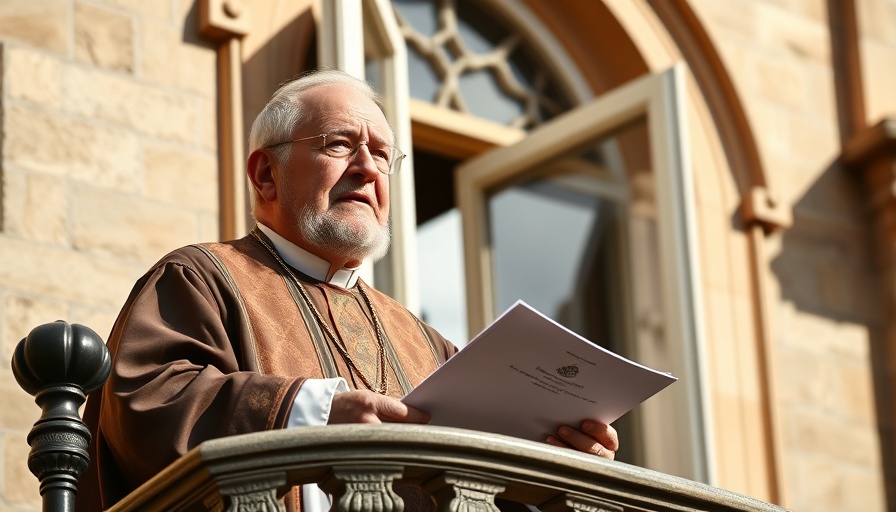
The Pope's Powerful Address on Gun Violence
In a historic address, Pope Leo has voiced a strong condemnation of gun violence, a topic that resonates profoundly within the United States. His comments came in the wake of a devastating incident at Annunciation Catholic School in Minneapolis, Minnesota, a tragedy that claimed the lives of two young children and left 18 others injured. Speaking during the Angelus prayer at Saint Peter's Square, the Pope emphasized, "Let us plead God to stop the pandemic of arms, large and small, which infects our world." His choice of words highlights not only the immediacy of the issue but also the ongoing gun violence epidemic plaguing the nation.
In 'Pope Leo calls for end to ‘pandemic of arms’ after Minneapolis school shooting,' the Pope addresses a crucial topic, inspiring us to reflect on our role in advocating for change.
The Significance of American Leadership in the Church
Pope Leo is the first American pope, and this fact carries weight given the current climate surrounding gun control debates in the U.S. This unprecedented perspective offers a unique understanding of the socio-political context surrounding gun ownership and mass shootings in America. The Pope's switch to English while addressing the school shooting ensures that his remarks were directly tied to the nation's struggles with gun violence, aiming to resonate deeply with American Catholics and citizens alike.
The Call for Action Beyond Thoughts and Prayers
In his address, the Pope not only offered prayers for the victims but made a compelling case that these prayers should lead to action. Many recognize that the phrase 'thoughts and prayers' has increasingly been criticized as a sign of inaction. Father Edward Beck, a Roman Catholic priest, expressed that while prayer is essential, it must be coupled with action. This highlights a powerful narrative: that faith must inspire tangible changes and advocacy for sensible gun control legislation.
Implications for American Catholics
The remarks by Pope Leo serve as a crucial reminder for American Catholics to reflect on their role in advocating for change. Historically, U.S. bishops took a strong stand on gun control, especially after the 1994 Assault Weapons Ban, which they praised. As noted by Father Beck, the correlation between the expiration of this ban and the rise in mass shootings is a calling for the faithful to engage with legislative processes to advance gun safety measures. The recent comments from the Pope could reignite this advocacy, encouraging Catholics to work towards solutions that safeguard their communities.
Heartfelt Engagement with the LGBTQ Community
Further underscoring his inclusive approach, Pope Leo met with Jesuit priest and LGBTQ advocate James Martin. During this meeting, Martin expressed the positive vibe he felt from the Pope, who openly welcomes LGBTQ individuals within the church. This openness is particularly striking in light of Pope Francis's previous decree allowing priests to bless same-sex couples. By embracing such diverse communities, the Pope reinforces the church's position as a supportive space for all, which complements his stance on other contentious issues, such as gun violence by showing that the church seeks to nurture rather than alienate.
What Lies Ahead: Hopes for Change
As Pope Leo’s term unfolds, there is widespread speculation about how this new leadership will address critical issues such as gun violence and LGBTQ rights. Engaging with local communities and advocating for sensible legislation may pave the path ahead. There remains hope that the powerful words of the Pope will encourage Catholics everywhere to push back against the culture of violence and bring meaningful change to the dialogue surrounding gun control.
Pope Leo's remarks serve as both a spiritual call to action and a grounded plea for serious discourse on gun control and inclusivity within the church. By calling upon both prayer and action, he elevates the conversation, allowing it to transcend mere statistics or incidents to centralize it as a real issue affecting God’s children.
As discussions continue on this vital topic, what can each of us do to contribute to making a safer society? Engage with your local leaders, advocate for reform, or simply educate yourself and others on this pressing issue. Let us transform our thoughts and prayers into actions that foster a culture of peace and acceptance.
 Add Row
Add Row  Add
Add 




Write A Comment